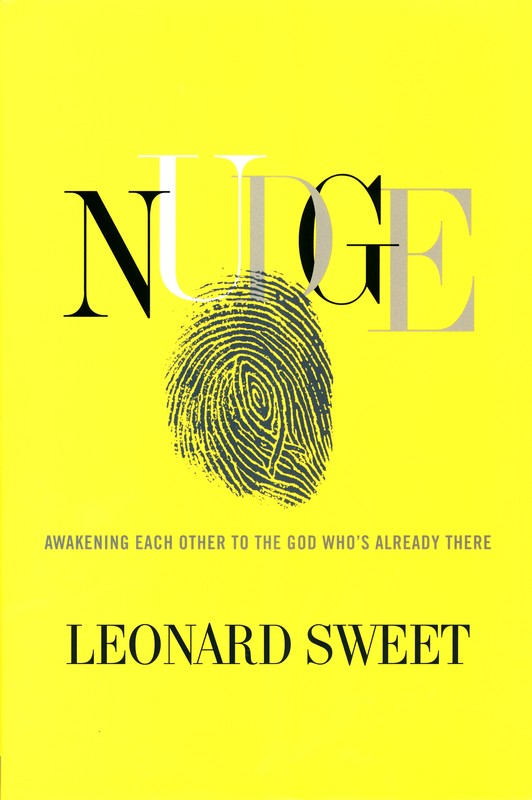I received a review copy of Nudge by Leonard Sweet from The Ooze at the busy beginning of this fall term and have been working since then to get through it. I finally finished this weekend, thanks to some travel reading time.
The central contention of Nudge is beautifully compelling: evangelism (the sharing of Good News) isn't about browbeating, convincing, arguing, or making something happen; it's about opening ourselves to the wonders of God's presence in the world and nudging others into a similar noticing: "The purpose of a nudge is to manifest Christ in a moment of mutual knowing" (29).
Sweet approaches this project of a redefined evangelism through a brief fore into the field of semiotics, and he relies heavily not only on the central metaphor of the nudge but also on the attitude and practice of attention. This emphasis on attention and semiotics expresses itself in the book's second half in a series of chapters on the five senses.
Needless to say, the book appeals to me on a variety of levels: on this blog, I practice a similar awareness of the five senses each Friday; I am writing a dissertation that similarly takes "attention" as one of its central concepts. Even more, I am encouraged by the very fact of a seminary Professor of Evangelism is describing evangelism in this way, not as rational argumentation about facts, but as relational sharing in the wonder of the Spirit's presence and activity in the world: "What counts in evangelism is not cognition, but recognition. Can we identify the face of Christ when he shows it to us? What is our receptiveness to the Spirit, who appears in others and in each other?" (69). It seems to me that in our contemporary culture, belief in God--and in the profound mystery of the Incarnation--is never a matter of straightforward intellectual assent; it is a matter of interpretation (or as philosopher Paul Ricoeur would say, hermeneutics): through what rubric do we interpret our experience of the world? Sweet's version of evangelism in this book, I think, is all about sharing an interpretive paradigm of a certain kind of Christian faith (a sacramental paradigm?), and all the depth and joy it offers.
Despite my glowing praise, I must say that as a whole, I think Nudge undermines its central claims. Sweet's energy is at points enlivening (and enviable), but despite frequent recourse to numbered subheadings, the book's argumentation is often hard to follow because it jumps so frequently from topic to topic. The text is full of metaphors, aphorisms, and acronyms, some of which work beautifully but the bulk of which are just a little distracting. The type of attention performed by this book is a surfacey, jumpy, almost schizoid flitting from one thing to the next, a caricature of pomo bricolage.
I understand that this breadth of attention--from classical theology to contemporary poetry to cutting-edge science to Latin etymology to pop-culture references--makes a very strong point about the whole-world scope of the Spirit's activity, if we're looking. But the result is not only a participation in the lack of focus Sweet himself seeks to counter in chapter two-and-a-half, "Watch, Witness, and Bear Witness," it is also a tendency to oversimplify, misinterpret, and even misrepresent. Thus, Sweet's explanation of semiotics seems (to a student and teacher of literary theory) rather thin. His description of Simone Weil as a "factory laborer-turned-philosopher" (104) inaccurately spins the truth for rhetorical purposes about everdayness (Weil was a teacher who chose for political reasons to work in a factory for a while). A number of repetitions and awkward sentences in the book give the sense that it was composed in a rush (not surprising: the life of a professor / writer / public speaker can be a frantic one). My advice to Professor Sweet, if I may quote him: "Slow down. Pay attention."
Nudge is certainly worth a quick read, and it participates in a key conversation about the contemporary need for a spiritual discipline of attention. (For a more sustained treatment of this topic, I'd recommend Simone Weil's Waiting for God, particularly the essays in its second half.) I hope this book will continue to challenge old models of proselytizing that fail to consider what's good about the Good News and a Protestant propensity to underacknowledge signs of God's goodness in the world.
If you decide to buy it, please go indie!
Tuesday, September 28, 2010
Subscribe to:
Post Comments (Atom)





Thanks for your interesting, thorough, thought-provoking review, Cindy. I have heard varying things about Sweet, but have yet to read any of his books.
ReplyDelete